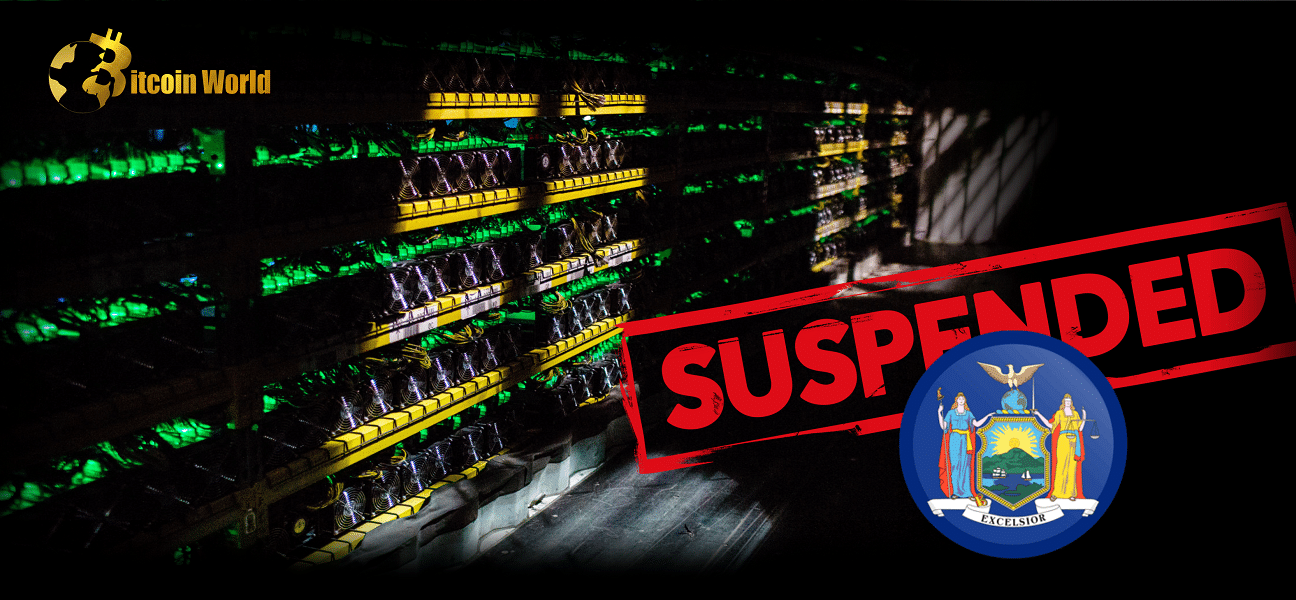The cryptocurrency world just witnessed a significant shift. Despite strong opposition from the digital asset industry, New York has officially become the first state in the US to put a temporary halt on new Bitcoin mining operations that rely on fossil fuel power plants. This landmark decision by Governor Kathy Hochul has sparked considerable debate and raises crucial questions about the future of crypto mining and its environmental footprint. Let’s dive into what this means.
What Exactly Happened in New York?
In a nutshell, Governor Hochul signed a bill into law that introduces a two-year pause on issuing permits for cryptocurrency mining facilities that intend to convert fossil fuel power plants into mining hubs. Think of it as a time-out for this specific type of mining activity within the state.
- Temporary Freeze: No new permits will be granted for two years to crypto mining businesses looking to repurpose fossil fuel plants.
- Existing Operations Limited: Current mining operations using fossil fuels are restricted to their existing electricity consumption levels. They can’t ramp up their energy usage.
- Renewables Get a Pass: Importantly, this moratorium doesn’t affect mining operations that utilize renewable energy sources. They can continue and even expand.
Why This Decision? The Environmental Angle
The driving force behind this legislation is the concern over the environmental impact of Bitcoin mining, particularly when powered by fossil fuels. Bitcoin’s underlying technology, the proof-of-work (PoW) system, requires significant computational power, and thus, substantial energy consumption.
Bitcoin Mining and Energy: The Basics
Let’s break down why Bitcoin mining needs so much energy:
- Proof-of-Work (PoW): Bitcoin uses a system where miners compete to solve complex mathematical problems to validate transactions and add new blocks to the blockchain.
- Energy-Intensive Process: This competition requires specialized hardware running constantly, consuming a lot of electricity.
- Carbon Footprint Concerns: When this electricity comes from fossil fuels, it contributes to greenhouse gas emissions.
The proponents of the moratorium point to Bitcoin’s considerable carbon footprint. In fact, some estimates suggest Bitcoin’s annual energy consumption is comparable to that of entire countries like Belarus. This environmental impact is what New York aims to assess and potentially mitigate.
The Crypto Industry’s Response: Disappointment and Concerns
Unsurprisingly, the cryptocurrency industry has voiced strong opposition to this measure. Groups like the Chamber of Digital Commerce argue that this decision unfairly targets the crypto industry.
Key Arguments Against the Moratorium:
- Singled Out Industry: The industry feels it’s being unfairly targeted, with the Chamber of Digital Commerce stating, “no other industry in the state has been sidelined like this for its energy usage.”
- Impact on Innovation: Concerns are being raised about the potential negative impact on innovation and investment in the cryptocurrency sector within New York.
- Job Losses: There are fears that this moratorium could lead to job losses within the mining industry in the state.
What Does This Mean for the Future?
New York’s move could set a precedent for other states grappling with the environmental implications of cryptocurrency mining. Here are some potential takeaways:
Potential Implications:
- Shift Towards Renewables: This could incentivize Bitcoin miners to increasingly seek out and utilize renewable energy sources.
- Relocation of Mining Operations: Miners might look to relocate to states with more favorable regulations and energy policies.
- Increased Scrutiny: This decision highlights the growing scrutiny of the environmental impact of proof-of-work cryptocurrencies.
- Policy Discussions: It’s likely to fuel further discussions and policy development around sustainable crypto mining practices.
The Political Landscape: A Post-Election Decision
It’s worth noting the political context. Governor Hochul signed this bill into law after winning the recent midterm elections against Lee Zeldin, who was considered more supportive of the crypto industry. This suggests a clear stance from the state government on prioritizing environmental concerns in this context.
Looking Ahead: What’s Next?
The next two years will be crucial. New York will be evaluating the environmental impact of Bitcoin mining, and the cryptocurrency industry will likely continue to advocate for its interests. The outcome of this moratorium could significantly shape the future of Bitcoin mining in the US and potentially influence global trends.
In Conclusion: A Balancing Act
New York’s decision to temporarily halt new Bitcoin mining at fossil fuel plants represents a significant step in addressing the environmental concerns associated with this energy-intensive industry. While the crypto sector expresses its reservations, the move underscores the growing need to find a balance between technological innovation and environmental sustainability. The next two years will be a period of observation, adaptation, and likely, further debate as the implications of this landmark decision unfold.
Disclaimer: The information provided is not trading advice, Bitcoinworld.co.in holds no liability for any investments made based on the information provided on this page. We strongly recommend independent research and/or consultation with a qualified professional before making any investment decisions.


